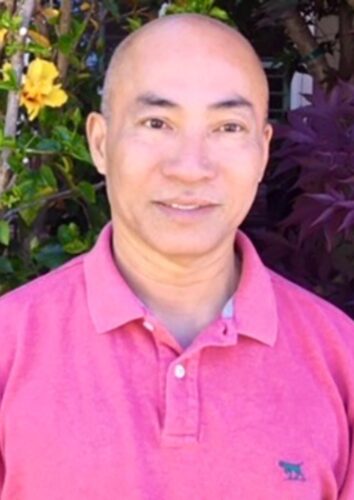This is an interview article with Marvin. Marvin’s responses are highlighted in light green.
This time, we had another conversation with Marvin. We discussed a pattern that many people easily fall into—blaming others, especially those closest to us.
<We Are Always Present When Problems Occur>
── The last interview article with you, Marvin, was very well received. Many students commented that they enjoyed your insights. So, I applied to the Asia coordinator for another opportunity to speak with you. I’m so happy we meet again.
Thank you very much.
Every experience is an opportunity. What’s important for us is to become aware of our place in the universe. Everything we experience is about ourselves, not about others—whether it’s our neighbors or our friends and what they say or do.
When I first started practicing Ho’oponopono, Dr. Ihaleakala Hew Len would always say to me, “Have you noticed that every time a problem arises, you are there?”
We are always present when problems occur. This is because we are connected to the situation and the people involved.
I recall an experience I had. When I travel, I always do a lot of cleaning.
Once, when my wife and I were at the airport, I saw a man approach an airline counter. His face showed visible anger. I looked at him and even mentioned it to my wife, saying, “Look at that man over there.” But at the same time, I was cleaning. I used the cleaning tools to clean my experience of seeing that man. Because the fact that I noticed him meant that he was part of my experience. And I wanted to clean my experience.
After a while, the man left. But not long after, he returned to the airline counter. However, this time, for some reason, he spoke to the staff in a calm manner.
What I want to say is that when we experience something, we do so for a reason. What’s important is that we clean and return to a state of peace. Thank you.
<The Key Is to Focus on Cleaning>
── Yes, it’s truly fascinating. But we often fall into habitual thinking. When faced with a problem, we tend to blame or complain about external people, situations, or things first. Then later, we realize, “Oh, I forgot to clean!” This pattern repeats itself again and again. So, it seems we need constant practice to re-educate our Unihipili.
We need to stay focused and continually remind ourselves where the real problem comes from. The problem comes from the memories that are replaying.
As you mentioned, we can easily fall into the habit of blaming others.
For example, when we experience issues in relationships, we may blame our fiancé, partner, boyfriend, or girlfriend.
But the answer is always within us. When we clean and return to inner peace, we reconnect with our true selves.
One thing we must remember is that our true selves are already perfect. No matter what our mind tells us, that fact does not change. What our mind says is not real.
When we experience a problem, it is a moment when we have lost connection with Divine Wisdom.
When we truly look within, we realize that the real issue is the replaying memories in our subconscious.
We don’t know what memories exist in our subconscious. These memories come from countless past lifetimes.
And in this lifetime, we are given the opportunity to free ourselves from them, allowing us to move forward into a new chapter of life.
This is what truly matters—to know that our true selves are already perfect.
Dr. Ihaleakala Hew Len said that people start wars because, in those moments, they forget who they truly are. They forget that they are already perfect.
If we are at peace, we will see others as perfect, too.
Right now, as I look at both of you (Xiaolin and translator Ying-lun), I see perfection.
The computer is perfect. The land is perfect.
When someone brings me an experience, I see that person as perfect. I don’t think they have done anything wrong. Instead, I recognize that what I am experiencing comes from within me.
So, the key is to keep focusing on cleaning.
It’s easy to get distracted because we are so used to thinking.
We ask, “Why is this happening to me?” “What’s going on now?”
Our natural reaction is to blame others.
However, when we choose to clean our experience, the related memories are released—no matter what they may be.
Sometimes, we may feel like the same problem is happening again.
But every time we clean, the memories involved in that cleaning are released, not just from us but from everyone and everything connected to them—people, objects, land, and even elements of the universe.
So, it’s not that the same problem is returning; rather, different memories are surfacing.
<There’s a Reason We Become Family>
── I’ve noticed that when we learn to clean, it’s often easier to clean experiences related to people or situations further away from us. But when it comes to our closest relationships—our spouse, children, parents, or siblings—it’s much easier to complain or blame them.
We often fall back into familiar reactions and patterns.
So, Marvin, how do you clean your relationships with your family—your wife and children?
How do you keep yourself from blaming them, even when things happen or when something bothers you?
In my own life, if I see my husband doing something wrong, my first instinct is to point it out.
Thank you for your question.
Cleaning family relationships feels harder because we have emotional connections with them.
When I’m with my family, I don’t want to say something and later realize that it hurt them.
So, for me, it often feels like I am caught between two things—I want to say something, but I also don’t want to say it.
When my wife and I argue, I have learned from experience that every time I speak, I get into trouble.
So, I clean.
Let me share a story with you.
One time, my wife and I were driving somewhere. I was behind the wheel, and she was giving me directions—”Turn right here, turn left there.”
I followed her directions without arguing.
At one point, she said, “I think we’re lost.”
I responded, “I saw a road back there that we could take. Should we try that?”
But when I originally saw that road, I didn’t mention it.
As a result, there was no argument between us.
Throughout the whole process, I was continuously cleaning.
Later, we did end up arguing. I don’t remember exactly what I said, but at one moment, my wife became very upset.
So, I chose to remain completely silent—for about two hours.
She kept talking, and when she finally calmed down, she asked, “Why aren’t you saying anything?”
I simply replied, “There’s nothing I need to say.”
Then, just as I was getting onto the highway, a huge truck passed dangerously close to our car.
At that moment, I realized how important cleaning is.
If I hadn’t been cleaning, I might have crashed into that truck.
As we talked about earlier, cleaning feels harder when it involves family because of the emotional ties we share.
They are so close to us that it makes cleaning feel more difficult.
But what we truly need to focus on is ourselves.
We need to recognize that behind these experiences and emotional connections, there are shared memories with our family members.
There is a reason they are our family—whether they are our spouse, children, parents, or relatives.



